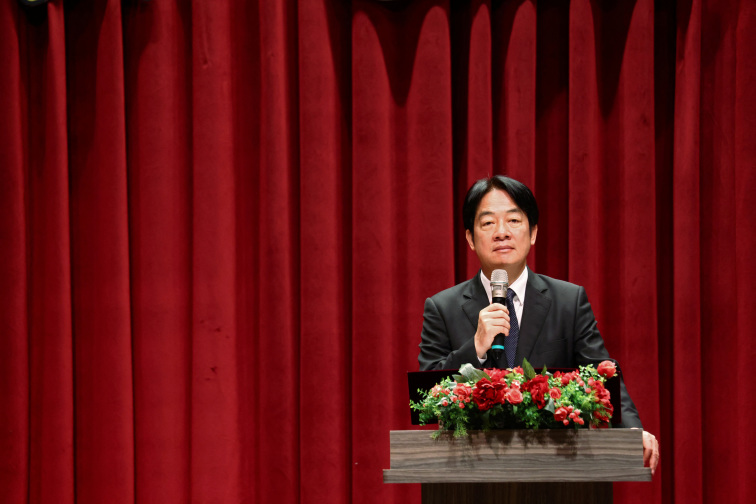On December 1, 2024, hundreds of villagers from Dadun Village, Xintang Town, Zengcheng District, Guangzhou, united in protest against the local government's practice of setting up checkpoints to charge parking fees. (Video screenshot)
[People News] China's long-term economic downturn has left grassroots governments unable to repay their debts, prompting them to resort to various means to increase revenue. One of the most common tactics has been arbitrary fees and fines, which have sparked widespread public resentment and numerous protests.
On December 1, in Dadun Village, Xintang Town, Zengcheng District, Guangzhou, the village committee angered residents by erecting a booth to impose unjust parking fees, triggering a united protest by the entire village.
Videos circulating online show that on the evening of December 1, 2024, hundreds of residents gathered in Dadun Village, Xintang Town, to denounce the local government's setup of checkpoints to charge parking fees. Enraged villagers destroyed the toll booth, with some removing a door to ram it into the booth, shattering its glass walls, while others dismantled the barrier used to block vehicles. Onlookers cheered and applauded.
Authorities dispatched a large number of police officers to "maintain stability," but due to the villagers' strong unity and overwhelming momentum, the police did not take action, and no physical clashes occurred.
According to the video, the incident was sparked when the village committee leased all the parking spots in the village to a contractor who then set up toll booths. Local residents felt the fees were excessive, with even previously parked cars being required to pay retroactively. This led to the protest. Angry villagers also marched to the local police station, where one man destroyed the toll booth.
Later in the evening, officials from Xintang Town addressed the crowd, announcing the cancellation of the parking fees and promising to refund all previously collected charges. Only then did the crowd disperse.
Mainland Chinese media did not report on this incident, and there is no related information on Weibo. However, videos of the protest circulated overseas, sparking heated discussions among netizens.
Netizens commented: "In recent years, almost every urban village has installed toll systems around the village. You have to pay to leave, and there are also monthly or annual packages." "The Communist Party is out of money and has started squeezing every penny from the people. Anything can be taxed now—parking lots are a daily cash grab, and the Party wouldn’t miss such an opportunity." "Rights ultimately have to be won through firm resistance, not by begging on your knees." "Police are now overwhelmed by stability maintenance, miserable and full of complaints, especially as even their salaries aren’t guaranteed anymore." "The hope for China lies in the south; the north is hopeless." "Guangzhou people still have what it takes. No wonder Guangzhou’s economy is strong. Wishing the people of Guangzhou happiness and grace. Keep it up together." "Good! Resistance is the way to fight for rights." "If they take up arms, the effectiveness will skyrocket." "Set up a barrier and slap a QR code on it—just like that, the government starts charging. Overthrowing such a government isn’t surprising." "China has entered an era of non-cooperation." "When will all the people of China unite? Breaking the information blockade is a crucial issue." "Impressive! On the first day of charging fees, the toll booth was smashed, and they won!" "Guangdong people are fierce. Remember, the revolution to overthrow the Qing dynasty started in Guangzhou. After many struggles, the Republic of China was successfully established." "The same thing is happening in Jiangsu and Zhejiang now. Entire villages are fenced off, and parking fees are charged for entering. Especially in industrial areas, people should learn from Zengcheng, Guangdong. Resistance is the only way to secure rights." "This is what it means for the people to truly take charge." "The people of China are now organized and should not be provoked. If pushed too far, it will be hard to handle."
Although the three-year "Zero-COVID" lockdown policy has ended, the resulting economic damage remains irreparable, exacerbating the financial difficulties of local governments. To compensate, local governments have resorted to extreme measures, such as arbitrary fees and fines, which have fueled public resentment.
In October, mainland Chinese scholar Liu Chengliang revealed that in 2022, fines and confiscations (fines plus seizures) nationwide totaled 428.3 billion yuan, the highest in a decade.
After the CCP's Third Plenum in July, the government introduced several fiscal measures, including transferring consumption tax to local authorities and consolidating local surcharges for increased collection. The central government also confirmed that local governments would gain greater control over non-tax revenue, including highway tolls.
Chinese-American economist Li Hengqing previously told Epoch Times that the CCP central government’s decision to delegate non-tax revenue management was essentially a call for local self-rescue. "The central government won’t intervene anymore. Use any methods you can—whoever grabs the money will be credited as successful. In this scenario, they can only prey on ordinary people, who lack power and resources to resist and are left at the mercy of others."
However, the villagers of Dadun Village in Xintang Town have demonstrated to the outside world that in the face of the CCP’s aggressive exploitation, unity and a determined resolve to resist are necessary to overcome the violent and oppressive actions of local governments.











News magazine bootstrap themes!
I like this themes, fast loading and look profesional
Thank you Carlos!
You're welcome!
Please support me with give positive rating!
Yes Sure!